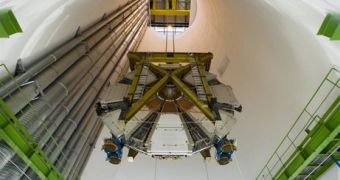With the fitting of the last major component of what is now the worlds largest particles accelerator, the build of Large Hadron Collider has been completed. All that remains now is to connect all the smaller components of the collider, in the hope that, by the end of this year, the preliminary experiments may begin. Spanning over a distance of 27 kilometers of tunnel shaped into a circular feature, the LHC is located under the ground between the Swiss-French border.
The tunnel has been formerly used by a previous particle accelerator operated by CERN, has a diameter of nine meters and, depending on the relief, it can reach debts of up to 100 meters underground. Rober Aymar, the general director of CERN says he can finally fell relieved that the collider was completed and waits with excitement the future experiments which may take place there.
The project, started back in 2003, costs the European Union nearly two billion US dollars to complete, and will have the role of studying the nature of matter and test several predictions made by physical theories. It is expected to become operational sometime this summer. The last component, installed on Friday, is created out of numerous particle detectors, made mostly of copper and aluminum metal, and will have the specific role of detecting elementary particles that result out of the collision between protons speeding through the collider at relativistic speeds.
As soon as the assembly of the smaller components is complete, testings can begin. All the sections of the accelerator will be cooled to temperatures close to absolute zero, in order to make use of the superconductive properties of certain materials. LHC-like particle colliders require extremely powerful magnetic fields to hold the beam of elementary particles from scattering in all directions, fields which can only be obtained through the use of supercondutors.
CERN is a scientific community formed of 20 European and observer states, with an annual budget of nearly 940 million US dollars. During the exploitation of LHC, more than 80 countries from all over the world will have the chance to conduct experiments to test the nature of matter in the universe, and the nature of the universe nonetheless.

 14 DAY TRIAL //
14 DAY TRIAL //